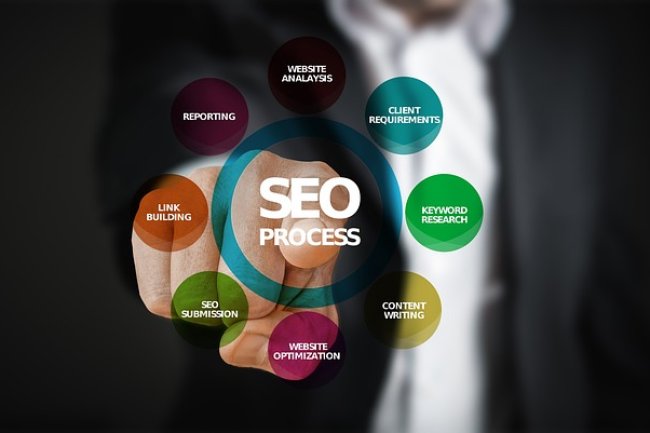On-Page vs. Off-Page SEO: Crucial SEO Battle for website
On-Page SEO improves site content, while Off-Page SEO for website focuses on external sites. differences and which tactics impact rankings and conversions.

What is Search Engine Optimization?
Search Engine Optimization for website, or the process of fine-tuning web pages to attract preference from search engines, and thus more organic traffic. This is a set of techniques that have alignment in making a website's visibility and improving the user experience in front of search engines, as well as for users.
SEO becomes important for businesses and individuals to create an online presence and to target the desired customers. Billions of searches occur per day on various search engines, and when having a higher rank in the search results, creates a huge impact on visibility, traffic, and leads in sales conversion.
SEO has been broadly bifurcated into two categories: on-page SEO and off-page SEO.
The optimization techniques applied to this content direct the website's structure and content. Optimizing page titles, meta descriptions, header tags, content quality, keyword usage, image optimization, and website architecture will ensure that search engines can crawl and index web content much more efficiently.
Off-page Search Engine Optimization for website focused on outside website-related issues, creating authority, and showing the website as trustworthy and relevant for the search engine; for instance, linking the process of obtaining high-quality backlinks from another well-established website for social media marketing, brand mentions, and local citations. Off-page SEO is trying to build reputation and credibility for a website that tells the search engine it is an authoritative and trusted source of information.
A good SEO strategy has both on-page and off-page SEO as the foundational strength. On-page optimization means that a website is optimized in such a manner that it remains search-engine friendly and pleasing to the visitor. Off-page SEO enables one to establish credibility and reputation for a website through proper efforts, thus supporting its chances of ranking later.
On-Page SEO: Optimizing Your Website
On-page SEO is a practice of optimizing single pages of websites to enhance their ranking in SERPs, which means making them more visible in the list of search results. There are different techniques employed that all aim to improve the content, structure, and technical aspects of a site so that it might be more search-engine-friendly and user-friendly.
Content optimization is a very key on-page SEO activity that revolves around producing high-quality, informative, and engaging content relevant to the chosen keywords and topics. Keywords are used effectively throughout the text including title, headlines, and body by search engines to better understand the relevance and context of that particular page.
Keyword research is the most important part of on-page SEO. It is the way you determine the relevant and high-traffic keywords and phrases used by customers to search for products, services, or information concerning the business or any information relevant to it. When you target the right keywords, it automatically heightens the chance of your website appearing on the list of search results, which are related to it.
Meta tags are HTML pieces, including the title tag and meta description, that provide important information to a Search Engine Optimization for website regarding what content a certain web page holds. One is to optimize these tags with relevant keywords and compelling descriptions to make your website more appealing to search results and potentially increase click-through rates.
One final important aspect of on-page SEO is the URL structure. Descriptive and well-structured URLs with relevant keywords will support how the search engine understands the content on a page and may make the page appear in more results.
Off-Page SEO: Building Authority and Trust
Off-page SEO is a group of strategies and activities one is doing outside of your website, which improves credibility, authority, and visibility to a search engine. Essential off-page SEO factors of how a website ranks in relevant searches include the following major strategies:
Quality backlinks from the right web sources are one of the most visible off-page SEO factors. The engines rank Web pages high based on content quality and relevance endorsements from other websites, which are backlinks. Nevertheless, this should be earned naturally through editorial links rather than manipulative means including buying links or link schemes.
Social Media Engagement: This will indirectly add support to off-page Search Engine Optimization in Bangalore as using Facebook, Twitter, LinkedIn, or Instagram to share key value content and engage with the audience is a perfect avenue for achieving brand recognition, referral traffic generation, and even attracting backlinks from information shared by individuals interested in your information.
Local Citations and Listings: For local companies, it is important to be certain of the proper citation that is consistent in online directories, review sites, and local business listings. Citations will allow search engines to know the location of your business, your operating hours, contact information, and other details necessary for ranking in local searches.
Brand Mentions and Co-Citations: When good sites and publications mention your brand name but do not link back to you, you are still building your online reputation and authority. Search engines might use this as relevance as well as trust signals: co-citations when your brand name is mentioned with other relevant entities.
The Importance of Relevance of Content
In on-page SEO, the relevance of the content plays a very important part in determining whether or not a website can rank well for any specific search query. The websites with quality content that would inform the user and meet their requirements are given better rankings. Proper insight into creating the type of information that directly answers the user's search intent will enhance its ranking.
Relevant content helps to demonstrate what your website is about to the search engine and enhances the user experience. Since visitors find exactly what they want on your site, they tend to spend more time engaging with your content and may even become lead or subscriber prospects. This user behavior sends very positive signals to the search engine, which says your content is worthwhile and will rank higher.
Good content also helps you target specific keywords and phrases that your target audience is searching for. And the better the keyword research you do and include those naturally within your content, the greater the likelihood of your website appearing in a sufficiently related search result.
Keyword stuffing isn't a strategy for anything, because while doing this preparation of content, you are literally stuffing words into your mouth. Today, the search engines are advanced enough to easily recognize manipulative techniques like keyword stuffing and even penalize them. Instead, work towards high-quality informative and interesting content that addresses the users' actual needs and provides value.
Link Building Strategy
Link building is an important off-page SEO process through which high-quality backlinks are earned from well-reputed sites. Backlinks can be compared to "votes of confidence" from a site, indicating to the search engine that your content is valuable and authoritative. Here are some methods you can use for link building:
Guest Blogging:
Identify those websites in your niche and volunteer to write quality, unique, and relevant content for them as guest posts. This will give you the opportunity to add a link to your website while offering value to the audience of the host site.
Broken Link Building:
Identify some broken links on your high authority websites and send a mail to the webmaster offering your content as an alternative to the broken link. It also helps you get the backlink to your website while providing value to the site and its users.
Resource Page Link Building:
Most sites maintain resource pages-a list of useful tools, guides, or other content relevant to their business or niche. Find such pages and submit your content for them to consider, potentially earning a highly valuable backlink.
Skyscraper Technique:
Find high-quality, highly linked-to content in your niche, create something even better (a "skyscraper"), and then reach out to websites that have linked to the original content, suggesting they update their links to point to your superior resource.
Influencer Outreach:
Find influential people in your industry, and partner with them to create co-branded content, or simply ask them to share or link to your content of value.
Unlinked Mentions Outreach:
Find the mentions of your brand or website without any links and reach out to the webmaster asking them to place a link to your site, courtesy.
Keep in mind that effective link-building is really about quality over quantity; having one or two high-authority backlinks is worth far more than chasing down a thousand low-quality links. Similarly, never forget to provide value to both the linking site and its audience through your content and outreach efforts.
Technical SEO Considerations
Technical SEO is essentially the sum of factors on the page that define how search engines crawl and index a website. On-page elements are crucial because they ensure that your site is ready for users as well as search engine bots.
- Site speed: Websites that take time to load make visitors bounce fast; sites may frustrate people, and Google penalizes your ranking. Optimizing page load times by compressing images, minifying code, and enjoying site browser caching can have huge impacts on the experience of your website and good SEO performance.
- Mobile-friendliness: As mobile now occupies the majority share of internet traffic, having a website that adapts to mobile really becomes indispensable. Search engines prefer those sites that can deliver a seamless experience for multiple screen sizes and devices. Elements that form a part of a mobile-friendly website include responsive design, optimized media files, and touch-friendly navigation.
- Security: Security for both the end-users as well as search engines is highly preferred. The use of encryption and addressing some vulnerabilities in addressing security for the protection of data used that will ensure to build trust. It can increase more ranking as well as more visibility in the search result.
- Crawling: This is the procedure by which search engines use crawlers to discover and index the content on your website. The components involved in ensuring that your site is crawlable include optimizing robots.txt files, XML sitemaps, and the linking structure within your site. This allows search bots to navigate through your pages efficiently and index them favorably.
- Indexability: Even though your site is crawlable, technical issues may even make search engines fail to index correctly your content. Issues such as duplicate content, canonical URLs, and meta robots tags can greatly affect indexability. What matters is fixing those problems so that the search engine can better comprehend what it can even index for pages on your site.
Optimizing these technical on-page factors allows improvement of your site's visibility, provides a better user experience, and, consequently, improves search engine results to deliver more qualified traffic and maybe conversions.
Local SEO and Off-Page Signals
That is to say, it refers to optimizing your online presence to rank better in location-based search. Essential for businesses that service a specific geographic area or have physical locations. On-page factors like optimizing your website and Google Business Profile are important, but off-page signals play a big role in rankings for local.
Perhaps the most important off-page signal in local SEO are citations. Citations are online mentions referencing your business's NAP (name, address, phone number) information in directories, reviews sites, and other legitimate platforms. Consistent and correct NAP information across multiple citations helps verify a business's legitimacy and location in search engines, so you should see a positive influence on your local rankings.
Reviews are another essential off-page signal. Customers' positive reviews in Google, Yelp, and even industry-specific directories contribute much to your local visibility. The more reviews you gather, the more social proof and trust they will give, and therefore, the greater the influence on your ranking for local search engines. Reviews can be seen by engines as how satisfied customers are with that particular location and the kind of service quality they received.
Next, off-page local SEO also involves making local link building an essential practice. Sites that are considered to be credible, local-based sites, like that of the real business directories, news portal, or blog, usually lead to a high-quality relevant backlink that may really help your website reinforce its relevance and authority in a certain geographic area. Note that these should be the most natural links, and not manipulative links.
Measuring the Success of SEO
Measuring and analyzing the success of your SEO efforts determine the effectiveness of your on-page and off-page strategies. By tracking relevant metrics, you can identify areas for improvement and make data-driven decisions to optimize your SEO campaigns.
Rank Tracking
One of the most important things you'll want to measure is how your website ranks for targeted keywords. Rank tracking tools will allow you to see how your position in SERPs for specific terms changes over time. Over time, this kind of data can be useful in making sense of the impact of your on-page optimization efforts and where you might still have opportunities to improve.
Backlink Analysis
Off-page SEO is basically building high-quality backlinks from trusted sites. Therefore, using off-page backlink analysis tools gives the kind of information regarding the number of backlinks pointing at your site, quality, and relevance. Such a backlink profile monitoring will let you know your potential link-building opportunities and spot possibly harmful and spammy links harming your rankings.
Search Analytics
Beyond being useful for knowing how people are experiencing your website on organic searches, even Google Search Console and Bing Webmaster Tools can offer a wide range of useful information. One such statistic is impressions, clicks, CTR, and average position for specific keywords. They can also be used to catch technical issues - crawl errors or site speed problems that could be preventing you from performing as well in the SEO metrics.
Conversion Tracking
While rankings and traffic are great, the bottom line of SEO is really to measure conversion through sales, lead generation, or whatever else you want to be converted.
Conversion tracking, among other metrics, can really measure if your optimization efforts are paying off in the form of actual business outcomes. This metric then allows you to focus efforts and put resources towards optimizing the right page or area of your site.
User Engagement Metrics
Benchmarking user engagement metrics like bounce rates, time on site, and pages per session can be pretty revealing of the value of your on-page content and the quality of the user experience. So, high bounce rates and low time on site could point to problems both in relevance and usability affecting your SEO performance negatively.
This will allow you to track these key metrics on a regular basis, utilize the right tools, and know your performance in on-page as well as off-page SEO well enough. You will thus be in a better position to determine what you can do differently and thus make the right data-driven decisions for improving your overall search engine visibility and driving better results.
The Relationship Between On-Page and Off-Page SEO
Of-page SEO works include link building and social media engagement that create a high-quality network of backlinks and mentions, signifying that the website is valuable and reputable. These external signals reinforce on-page content relevance and quality, which will enable it to rank in search results.
In contrast, if the off-page SEO is quite strong but is not complemented by good optimization of on-page elements, then it won't produce the desired results. Unless that on-page content is well optimized, search engines cannot understand the context and relevance of your content, thereby not giving such content any value and a proper rank in the market.
The harmonious interaction between on-page and off-page optimization is highly important to achieving the best exposure to search engines. Once these strategies are combined, you generate a harmonious and integrated approach that maximizes the full potential of your website in terms of attracting organic traffic and achieving higher search rankings.
SEO Best Practices and Guidelines
In regard to SEO, it will always be proper to follow best practices or guidelines which ultimately have based their quality and sustainability on best ethical and user-friendly practices. Avoid "black hat" or deceptive practices which might lead to penalties, or worst, the removal of the websites from the indexes of search engines.
Best On-Page SEO Techniques
Write unique, highly informative content that will be very useful to your target audience.
Use proper keywords relevant to your content, but don't keyword stuff and overly optimize.
Use descriptive compelling titles, meta descriptions, and headings that properly describe the content.
Your website must have a clean, simple structure that has logical hierarchies and proper internal linking.
Optimize images and other media with descriptive file names and alt text.
Use responsive design to make seamless experiences on all devices.
Off-Page SEO Best Practices
Develop quality backlinks from good and relevant websites.
Apply content marketing and guest posting on authoritative sites within your niche.
Engage the audience by sharing your content through social media platforms.
Participate in online communities and forums relating to your industry.
Monitor and respond to online reviews and mentions of your brand.
Partner with influencers or industry experts and leverage them to also build your credibility and influence.
What's Your Reaction?
















